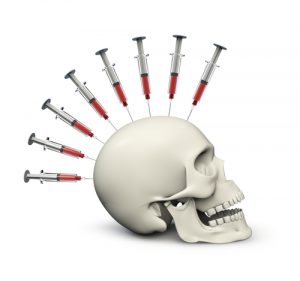Drinking problems are common among people. Many individuals who would not even consider themselves addicts experience problems with drinking. Utilizing liquor to cope with stress is the first sign, but when drinking starts to affect one’s life with work and school, one may need to reconsider one’s relationship with alcohol. There are furthermore, many high functioning alcoholics who deal with a problem but find a way to fulfill duties all the while still experiencing a drinking problem that is harming their health.

It is important then to understand oneself. It is important to see if a certain habit or substance negatively affects one’s life or if it a source of coping. These types of signs are signs of a possible issue that one should consider to rectify. In some cases, a certified Substance Abuse Counselor may be a way to find the help needed to re-direct one’s life.
The article, “‘I’m an Addiction Expert. These Are 3 Signs You Have an Alcohol Problem'” by NUNO ALBUQUERQUE reviews three key things he sees in his clients that possible identify a drinking problem. He lists the three total signs that drinking may be affecting one’s life negatively. He states,
“I have very few clients that go into residential treatment straightaway because they feel like they have a problem. Normally there are attempts to control or stop their drinking first. If you attempt to control your drinking, that implies to me that there is already a problem. When you say to yourself, “Tonight, I’ll only have three drinks,” and that becomes a theme, almost every night, that implies there’s a worry and you see your drinking as something you need to start observing a bit closer.”
“‘I’m an Addiction Expert. These Are 3 Signs You Have an Alcohol Problem'”. Nuno Albuquerque. November 15th, 2022. Newsweek.
To read the entire article, please click here
Commentary
Albuquerque points out that drinking issues usually are subtly noticed by a person when they start to think about limiting themselves to drinks even before they go out. These types of limits show that one is having issues controlling oneself. One must be held accountable. Other issues he points out is when those targets are especially missed. If one limits oneself to three drinks and has twelve, then issues are definitely on display. These dump into other parts of one’s social life in relationships, work and school.
Whether one is “officially” addicted, socially inclined to drink too much, or a “high functioning” alcoholic”, all three face issues with controlling alcohol in their life and how they choose to cope with problems in life. It is important to control intake and cope in other ways to avoid health issues, social distress and legal trouble.
Signs of Drinking Problems
Signs of drinking problems can be observed in individuals who display excessive alcohol consumption, or an inability to abstain from liquor, thereby compromising their daily functioning. In such cases, an individual may demonstrate a pattern of increased tolerance and withdrawal symptoms which are commonly associated with the development of physical dependency. Additionally, they may engage in impulsive behavior which is potentially deleterious to themselves or others while under the influence.
The deleterious effects of alcohol consumption on interpersonal relationships are undeniable. Regular drinking has been shown to undermine the ability to connect with others and to form strong social bonds. This may be due in part to diminished cognitive functioning, resulting from alcohol-induced neurobiological changes, particularly in the prefrontal cortex, which can lead to impaired judgement and an inability to recognize and respond appropriately to social cues.
Limiting Drinking
Limiting drinking is an effective method of reducing the potential for alcohol-related harm. By moderating one’s intake and forming healthier habits, individuals can reduce their risk of developing a dependency on alcohol or engaging in hazardous activities while under its influence. Furthermore, limiting drinking can help to diminish the incidence of negative physiological and psychological effects associated with excessive alcohol consumption. When attempts to limit drinking or meet goals fail, it may be time to talk to a Substance Abuse Counselor in how to better avoid drinking itself.

The cessation of alcohol consumption can be achieved through a variety of interventions that focus on reducing the individual’s susceptibility to relapse. These include behavioral techniques, such as cognitive-behavioral therapy; pharmacological approaches, including naltrexone and acamprosate; and psychosocial approaches, such as peer support and family therapy. Cognitive-behavioral therapy (CBT) is one such approach, which seeks to modify maladaptive thoughts, feelings, and behaviors related to alcohol use. Additionally, pharmacological interventions can be employed to alleviate cravings by introducing medications such as naltrexone or disulfiram.
Ultimately, individuals need to learn how to cope with stress without drinking. Coping without drinking can be described as the process of abstaining from alcohol consumption, either in the short-term or long-term, to manage negative emotions and stressors. This behaviour may involve a range of adaptive strategies such as self-reflection, positive self-talk, relaxation techniques and problem-solving exercises. Such strategies are often employed in conjunction with social support networks and/or therapeutic interventions to aid the individual in avoiding relapse into unhealthy drinking habits.
Conclusion
In conclusion, alcohol addiction is a serious issue that affects millions of people around the world. It can have devastating effects on the individual, their family and friends, and society as a whole. If any signs of alcohol addiction are present, it is crucial to seek help from a professional health care provider as soon as possible. With the right treatment, recovery from alcohol addiction is possible and many go on to lead healthy and fulfilling lives. Everyone deserves the opportunity to be free from addiction and live life to its fullest potential.
A certified Substance Abuse Counselor can also help one with addiction. While not all counselors tied to facilities are licensed counselors, many are still able to aid an individual with addiction. Others may require one on one therapies with a licensed counselor, or meet in peer support groups. AIHCP offers a Substance Abuse Counseling Certification for qualified professionals seeking a four year certification in Substance Abuse Counseling. The program is online and independent study and open to qualified professionals. Please review and the program and see if it meets your academic and professional goals.
Additional Resources
“Recognizing an Addiction Problem”. Mara Tyler. January 12th, 2018. Healthline. Access here
“Signs and Symptoms of Addiction”. Psychology Today Staff. Psychology Today. Access here
“Top 10 Ways to Eliminate Stress Without Alcohol”. Adl Jaffe. April 2nd, 2019. Psychology Today. Access here
“6 Alcohol-Free Ways to Unwind at the End of a Long Day”. Vivian Manning-Schaffel. September 23rd, 2021. EverydayHealth. Access here









